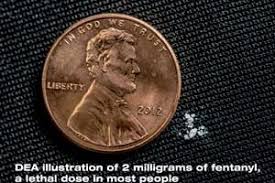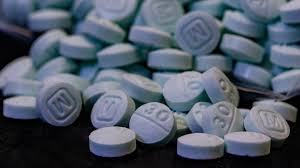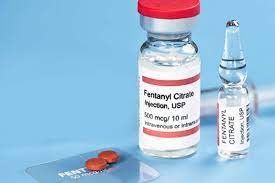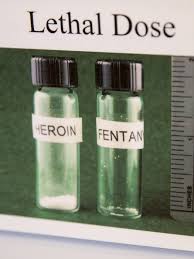Fentanyl is a potent synthetic opioid drug approved by the Food and Drug Administration for use as an
analgesic (pain relief) and anesthetic. It is approximately 100 times more potent than morphine and 50 times more potent than heroin
as an analgesic. Fentanyl is a Schedule II narcotic under the United States Controlled Substances Act of 1970.




What Is its Origin?
Fentanyl was first developed in 1959 and introduced in the 1960s as an intravenous anesthetic. It is legally manufactured and distributed in the United States. Licit fentanyl pharmaceutical products are diverted via theft, fraudulent prescriptions, and illicit distribution by patients, physicians, and pharmacists. From 2011 through 2018, both fatal overdoses associated with abuse of clandestinely produced fentanyl and fentanyl analogues, and law enforcement encounters increased markedly.
According to the Centers for Disease Control and Prevention (CDC), fentanyl analouges were involved in roughly 2,600 drug overdose deaths each year in 2011 and 2012, but from 2012 through 2018, the number of drug overdose deaths involving fentanyl and other synthetic opioid increased dramatically each year. More recently, there has been a re-emergence of trafficking, distribution, and abuse of illicitly produced fentanyl and fentanyl analogues with an associated dramatic increase in overdose fatalities, ranging from 2,666 in 2011 to 31,335 in 2018.
Street Names
Apache, China Girl, China Town, Dance Fever, Friend, Goodfellas, Great Bear, He-Man, Jackpot, King Ivory,
Murder 8, and Tango & Cash.
What does it look like?
Fentanyl pharmaceutical products are currently available in the following dosage forms:
oral transmucosal lozenges commonly referred to as fentanyl lollipops, effervescent buccal tablets (Fentora), sublingual tablets
(Abstral), sublingual sprays (Subsys), nasal sprays (Lazanda), transdermal patches (Duragesic), and injectable formulations.
Clandestinely produced fentanyl is encountered either as a powder or in counterfeit tablets and is sold alone or in combination with
other drugs such as heroin or cocaine.
How is it abused?
Fentanyl can be injected, snorted/sniffed, smoked, taken orally by pill or tablet, and spiked onto
blotter paper. Fentanyl patches are abused by removing its gel contents and then injecting or ingesting these contents. Patches
have also been frozen, cut into pieces, and placed under the tongue or in the cheek cavity. Illicitly produced fentanyl is sold alone
or in combination with heroin and other substances and has been identified in counterfeit pills, mimicking pharmaceutical drugs such as
oxycodone.
According to the National Forensic Laboratory Information System, reports on fentanyl (both pharmaceutical and clandestinely produced)
increased from nearly 5,400 in 2014 to over 56,500 in 2017, as reported by federal, state, and local forensic laboratories
in the United States.
What is the effect on the body?
Fentanyl, similar to other commonly used opioid analgesics (e.g., morphine), produces
effects such as relaxation, euphoria, pain relief, sedation, confusion, drowsiness, dizziness, nausea, vomiting, urinary retention,
pupillary constriction, and respiratory depression.
What are the overdose effects?
Overdose may result in stupor, changes in pupillary size, cold and clammy skin, cyanosis,
coma, and respiratory failure leading to death. The presence of a triad of symptoms such as coma, pinpoint pupils, and respiratory
depression are strongly suggestive of opioid poisoning.
Which drugs cause similar effects?
Drugs that cause similar effects include other opioids such as morphine, hydrocodone,
oxycodone, hydromorphone, methadone, and heroin.
See U.S. Department of Justice, Drug Enforcement Administration -
Drugs of Abuse | A DEA Resource Guide: 2024 EDITION.


